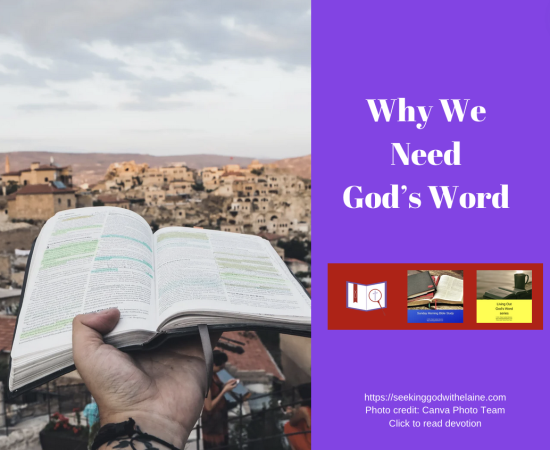Disciples are instructed to wait for Jesus’ return. This devotion begins looking at characteristics of sinful people in the last days who need to read God’s Word.
Nuggets
- We need God’s Word because Jesus’ return is coming.
- People in the last days will be sinful.
- Sinful people will put self above God.
- Sinful people love earthly things above God.
- Self-love is tied with pride.
Devotions in Living Out God’s Word series

We finished the Book of James in our Sunday Morning Bible Study. James gave us some pointers on how to live out our faith.
Next, we our going to look at living out God’s Word. It isn’t going to be a book study, but we will look at several passages to see why we need God’s Word.
This devotion begins to set the scene of the last days. It is breaking in a funny place, so we will have part two in the next devotion.
Let's Put It into Context
Here is a running list of nuggets for the series.
The Last Days
“But understand this, that in the last days there will come times of difficulty” (II Tim. 3: 1 ESV)
We need God’s Word because Jesus’ return is coming.
When don’t know when Jesus will return. We just know He is coming.
Jesus told us that His return will be preceded by persecution for the disciples (Mt. 24: 9). We are instructed to watch and endure.
Glossary
Paul is telling us to watch for the difficult times. We shouldn’t be oblivious to what is happening around us.
Owen addressed that. He wrote, “Not to be sensible of a present perilous season is that security which the scripture so condemns …”
Resource
I can see that. We would think it very odd for a person going around happy as a lark when everything is falling apart around them.
But it isn’t just going to be persecution. It will just be flat out hard living in those days.
Boston described what we will have to endure.
- Constantly getting the rug pulled out from under us.
- Uncertainty as to how to act in some situations.
- The struggle to keep out of danger.
- The struggle to remain steadfast in faith.
Resource
We know trials are given to us to grow our faith. To me, this verse says that the end days will allow us to show just how strong our faith in Him is.
Some might wonder why the end times should focus so much on sin. We have to remember that, when sin is prevalent, grace is more so.
It is very easy to solely focus on the troubles we experience. However, that isn’t to be the focus of our watching.
Our focus must be on Jesus’ return.
Boston made a great observation. God saves the best for last. Jesus’ return will be the absolute best.

People in the Last Days
“For people will be lovers of self, lovers of money, proud, arrogant, abusive, disobedient to their parents, ungrateful, unholy, heartless, unappeasable, slanderous, without self-control, brutal, not loving good, treacherous, reckless, swollen with conceit, lovers of pleasure rather than lovers of God” (II Tim. 3: 2-4 ESV)
People in the last days will be sinful.
When we hook verse 1 with verses 2 through 5, we see the trials don’t focus on physical trials. They focus on spiritual things.
At times, we look at lists like this one and say these will be the characteristics of non-believers. We shudder when we think this is how disciples choose to act.
But think about it. What did Jesus say? “And then many will fall away and betray one another and hate one another. And many false prophets will arise and lead many astray. And because lawlessness will be increased, the love of many will grow cold. But the one who endures to the end will be saved” (Mt. 24: 10-13 ESV).
- We can’t fall away if we haven’t made a confession of faith.
- We will make a conscious decision to follow someone other than God.
- Our love grows cold when we no longer read God’s Word.
- We will be fine if we remain steadfast until Jesus comes.
Let’s break down the list to see what take always we can find.
Lovers of self (II Tim. 3: 2)
Sinful people will put self above God.
No, this isn’t saying we shouldn’t love ourselves. We know that isn’t the case.
Loving ourselves is part of the second greatest commandment. “The second is this: ‘You shall love your neighbor as yourself.’ …” (Mk. 12: 31 ESV).
That tells us that the level of self-love is off.
Waterland hand an interesting take on what self-love is. He wrote, “It is nothing but the inclination of every man to his own happiness.”
Resource
Okay. When we put it that way, I would hook it with the conceit that is further down the list.
To me, that says we are so stuck on ourselves that we are focusing on us and what we can do for ourselves than looking to God. We think we can please and satisfy ourselves without realizing that He gives us everything that we have.
We are looking for the best of everything, and we think we can depend on ourselves to get it.
The bad thing about self-love is that it can delude us when we look at ourselves. The delusion can cover over our faults. We can find many reasons to convince ourselves that our faults aren’t really faults.
On the flip side, self-love delusion can also make us think too much of ourselves. When we do something good, we can put too much stock into it.
Beddome made a strong accusation. He wrote, “Self-love may be the sole foundation of men’s love to, and delight in, God. And indeed it is so with all hypocrites and formalists in religion.” A formalist is a person who gives the appearance of being a disciple, but in reality, isn’t.
Resource
It may be a strong accusation, but I think Beddome nailed it. When we are only interested in fire insurance, self-love can make us say we put our faith and trust in God when we, in reality, believe we can depend on ourselves.
That leads us to giving God lip service. We aren’t genuine in our worship of Him.
Beddome went on to say that self-love is the catalyst for our love of God. We look to God because we aren’t satisfied by our abilities to save ourselves.
We want something better for ourselves. That better, we find, is when we submit to God and His laws and commandments.
What this is all telling me is that there is good and bad in self-love. As with many things in our relationships with God, we have to have the right attitude.
Waterland thought one component of self-love is selfishness. I think, many times, that is what it all boils down to. We are more interested in ourselves than in God.
Resource
We have to put God as a priority, even over ourselves.
Lovers of money (II Tim. 3: 2)
Sinful people love earthly things above God.
The King James Version translates this as covetousness. Covetousness is an inordinate greed for wealth and possessions.
Yeah, our major sinful love is love of money. But the money, which is the wealth, gives us possessions, which we desire.
Waterland tied the covetousness to the self-love. I can see that, too. It is all about what we desire for ourselves — many times, to make us feel better about ourselves.
Resource
Our desires need to be put in check by more than what makes us feel better about ourselves. Waterland said we have to consider the circumstances and consequences.
God chooses the circumstances, and God chooses the consequences. We need to rely on God.
This pulls in selfishness. We want what we want it when we want it — even if it isn’t ours. We use our ambition to get it.
Proud (II Tim. 3: 2)
Self-love is tied with pride.
Pride has a big dose of self-flattery. Waterland tied self-flattery to our happiness. We covet things to make us happy and increase our self-love.
Resource
Vicious cycle, isn’t it?
But the problem, too, is that pride skews our self-love. Jortin said — in Elaine-speak — we elevate inferior things to a level of value, which in turn increases our self-love. It is mere show and delusion when we depend on inferior things to bring us happiness and self-worth.
Resource
This does pull in selfishness, too. Isn’t that a twisted self-love, also?
We can all have our moments of selfishness. That is putting our desires above the rights, needs, and comfort of others.
It is worse when an act is really a pretense. Instead of being real, it is an act of selfishness. That smacks of self-centeredness.
Pride usually finds an outlet in boasting. We want to let the world know how great we are.
The pride is connected to the covetousness. When we really want something and get it, we can’t stop talking about it. But that focuses on us, too.
I know. There was a lot of use of self in this section. There wasn’t a whole lot of reference to God.
That’s the problem. All of what we have talked about so far ignores God as Sovereign God.

Making the Connections
Let’s chase a rabbit for a second. Many are questioning if we are currently in the end times.
Let’s check out what Boston had to say. He wrote.
“The days of the gospel are the concluding period of time. In these last days are several particular periods; the first of which was the last time of the Jewish state, beginning from the time of our Saviour, to the destruction of Jerusalem; and more periods followed, and some are yet to come; but from the time of our Saviour to the end of the world, is ‘the last days?’”
Resource
That gives a good explanation as to why there were so many who thought their generation was the end times. It is one long end time from when Jesus ascended to when He returns.
So, when we read in Scriptures that the disciples thought they were in the end times, they really were.
How Do We Apply This?
- Remain faithful even in the hard times. Hall wrote, “The worse the times we live in are, the greater will our [honor] be, if we be faithful.”
Show ourselves to be against sin when sin may be all the world sees. - Get our hearts right with God by seeking Him.
- Search God’s Word to see what He has to say about the times in which we live.
- Pray for grace.
- See sin for what it is — separation from God.
- Diligently watch.
- Realize we can only find happiness in God.
- The only true happiness is eternal happiness.
Searching for and Seeking God
Hearing His Word (Rom. 10: 17).
Reading His Word (Rev. 1: 3).
Praying to Him (Heb. 4: 16).
Studying His Word (Ac. 17: 11).
Meditating on His Word (Ps. 1: 1-2).
Memorizing His Word (Ps. 119: 11).
Resource
Father God. We are waiting for Jesus to return. Help us take our focus off ourselves and put it on You. Amen.
What do you think?
Leave me a comment below (about this or anything else) or head over to my Facebook group for some interactive discussion.
If you don’t understand something and would like further clarification, please contact me.
If you have not signed up for the email daily or weekly providing the link to the devotions and the newsletter, do so below.
If God has used this devotion to speak with you, consider sharing it on social media.